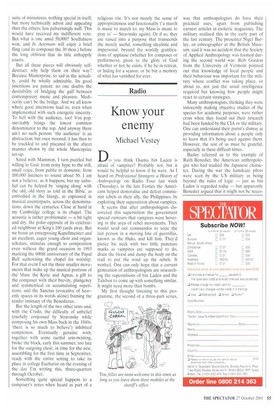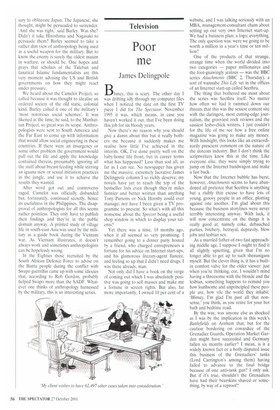Know your enemy
Michael Vestey
Do you think Osama bin Laden is afraid of vampires? Probably not, but it would be helpful to know if he were. As I heard on Professional Strangers: a History of Anthropology on Radio Four last week (Thursday), in the late Forties the Americans helped demoralise and defeat communist rebels in their ally, the Philippines, by exploiting their superstition about vampires.
It seems that after anthropologists discovered this superstition the government spread rumours that vampires were hovering in the area of rebel movements. They would send out commandos to seize the last person in a moving line of guerrillas, known as the Huks, and kill him. They'd pierce his neck with two little puncture marks as vampires are supposed to do, drain the blood and dump the body on the trail to put the wind up the rebels. It worked. One can only hope that a current generation of anthropologists are researching the superstitions of bin Laden and the Taleban to come up with something similar. It might need more than bombs.
My first thought listening to this programme, the second of a three-part series, was that anthropologists do have their practical uses, apart from publishing earnest articles in esoteric magazines. The military realised this in the early part of the last century. The presenter Nigel Barley, an ethnographer at the British Museum, said it was no accident that the Society of Applied Anthropology was formed during the second world war. Rob Gordon from the University of Vermont pointed out that knowledge of local people and their behaviour was important for the military where conflict was taking place, or about to, not just the usual intelligence required but knowing how people might react to certain strategies.
Many anthropologists, thinking they were innocently making objective studies of the species for academic purposes, were rather cross when they found out their research had been funded by the CIA or the military. One can understand their purist's dismay at providing information about a people only to learn that it's being used against them. However, the rest of us must be grateful, especially in these difficult times.
Barley referred us to the example of Ruth Benedict, the American anthropologist who had studied the Japanese character. During the war the kamikaze pilots were seen by the US military as being beyond the rules of logic — just as bin Laden is regarded today — but apparently Benedict argued that it might not be neces sary to obliterate Japan. The Japanese, she thought, might be persuaded to surrender. 'And she was right,' said Barley. Was she? Didn't it take Hiroshima and Nagasaki to persuade them? Barley seemed to take a rather dim view of anthropology being used as a useful weapon for the military. But to know the enemy is surely the oldest maxim in warfare, or should be. One hopes and prays that scholars of the Taleban and fanatical Islamic fundamentalists are this very moment advising the US and British governments on how they might react under pressure.
We heard about the Camelot Project, so called because it was thought to idealise an ordered society of the old static, colonial kind. Barley called it one of the military's 'most notorious social schemes'. It was likened at the time, he said, to the Manhattan Project, so great was its scope. Anthropologists were sent to South America and the Far East to come up with information that would allow social engineering in these countries. If there were an insurgency or sonic other problem the government would pull out the file and apply the knowledge contained therein, presumably ignoring all the stuff about breast-feeding while stirring an iguana stew or sexual initiation practices in the jungle, and use it to achieve the results they wanted.
After word got out and controversy raged. Camelot was officially disbanded but, fortunately, continued secretly, hence its usefulness in the Philippines. The disapproval of anthropologists for all this seems rather pointless. They only have to publish their findings and they're in the public domain anyway. A printed study of village life in south-east Asia was used by the military as a guide book during the Vietnam war. As Vietnam illustrates, it doesn't always work and sometimes anthropologists can be hopelessly wrong.
In the Eighties those recruited by the South African Defence Force to advise on the Bantu people during the conflict with Swapo guerrillas came up with some idiocies that, according to Rob Gordon, probably helped Swapo more than the SADF. Whatever one thinks of anthropology harnessed by the military, this is an interesting series.











































































 Previous page
Previous page